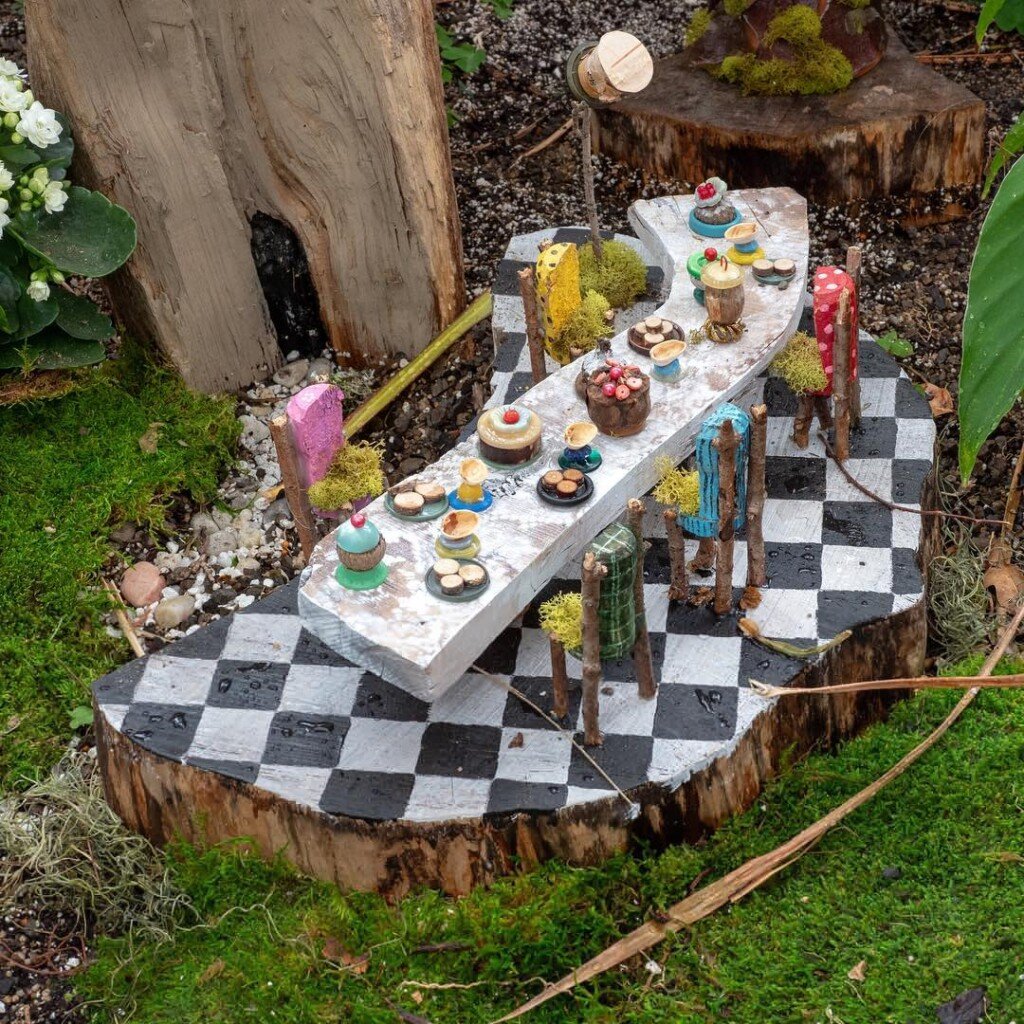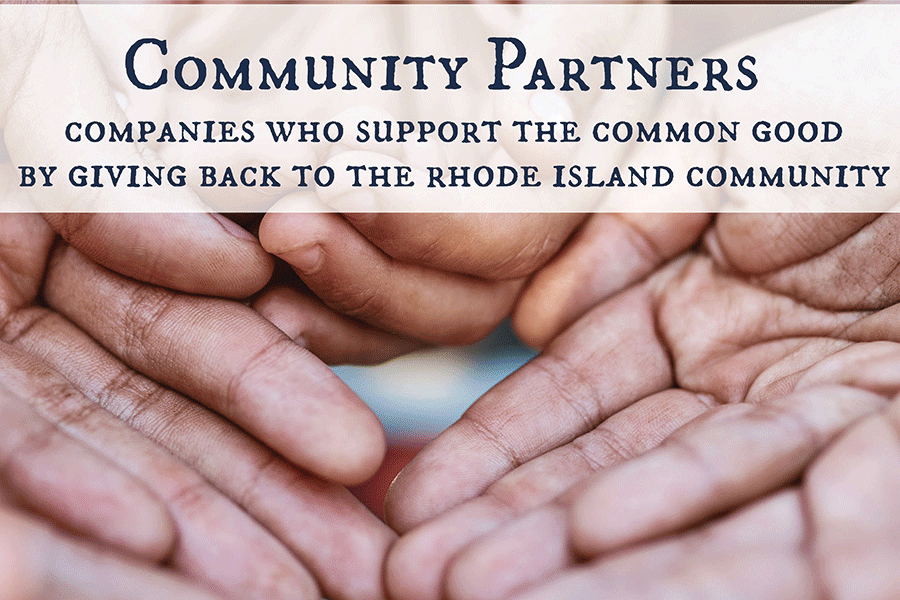How Kim Anderson is Planting the Seed of Plant-Based Eating in Rhode Island
The Rhode Island-based entrepreneur is on a mission to make plant-based eating go mainstream through her plant city-branded restaurants. And she's not done yet.

Kim Anderson, fourth from left, works closely with the team at Plant City. Each staff member holds an important item that represents their work at the restaurant. Photography by Angel Tucker
It’s a Wednesday morning in late August, and Kim Anderson, as usual, is short on time.
The owner and founder of Plant City walks through the marketplace of the plant-based food hall, adjusting items in the display case as she goes. Three years after its founding, the Providence restaurant has become a popular East Side hangout, attracting plant-eaters and omnivores alike with its promise of serious food served in a clean-but-casual aesthetic. This morning is no exception, and students and young professionals filter through the marketplace on the way to their favorite counters. At the far wall, Brown University students perch at a window overlooking South Water Street, sipping oat milk lattes and enjoying views of the Providence River. In a corner, a businessman types away on his laptop, a bag of yesterday’s baked goods ready to eat on the table. Behind Anderson, a pair of tourists in baseball caps and running shoes navigates a route to the trash can, staring around as they take in the airy, sunlit space.
“Welcome to Plant City. Can I take that for you?” Anderson asks, stepping forward to grab their compostable food containers.
The Barrington-based business owner founded the restaurant in 2019 in partnership with Matthew Kenney, a celebrity chef whose named already graced more than a dozen restaurants worldwide. A video of Kenney plays on the wall in the first-floor dining area, but it’s Anderson who moves through the space, greeting customers and checking in with staff. Her black Hoka shoes and zip-up jacket give the impression of an athleisure-clad maître d’, logging steps as she checks product inventory or lends an extra set of hands at the hostess desk. On this morning, she tours the restaurant’s patio with an assistant manager, inspecting the giant planters and decorative pillows with the practiced eye of a woman who spent several decades working in retail before entering the restaurant industry.
“Stand them up straight like little soldiers, and if any of them are dirty, we’ll get Lisa to get them clean for us,” she says, referring to the restaurant’s events and catering coordinator.
Esmeralda Lozano, the assistant manager, follows the lesson closely. Like many of her colleagues, she started at Plant City in the restaurant’s marketplace before quickly moving up the management ranks. Prior to landing the job a year ago, she says, she had little experience with plant-based eating.
“Growing up in a Hispanic household, veganism [is something] I didn’t really know much about,” she says.
Anderson prefers the term “plant-based” in her own communications, a conscious choice that reflects the restaurant’s menu as opposed to the all-encompassing lifestyle commonly associated with veganism.
“A lot of our guests are there for health or the environment,” she explains. “I use the word [plant-based] at the restaurant because we use a whole food, plant-based diet that’s welcoming to all.”
Anderson estimates as many as 70 percent of their customers are not fully plant-based eaters. For many, it’s their first exposure to a meat-free restaurant. It’s a charge she takes seriously, filling out the restaurant’s offerings with dishes that appeal to the most stringent converts as well as those new to the plant-based scene. A decade ago, many of these
offerings would have seemed foreign to the businesswoman who knew little about the impacts of a meat-heavy diet, a cause now central to her expanding restaurant world.
“It’s really just a message delivery system for beautiful, compassionate, sustainable food systems. Which I’m feeling more and more we need to get to,” she says.
Anderson did not set out to be a plant-based entrepreneur. A Barrington native, she interned in the buying offices of Jordan Marsh while studying at Chamberlain School of Retailing in Boston. She was accepted into the retail giant’s executive training program and placed as a sales manager in Rhode Island, later moving to New York City to work in the buying department at Macy’s. At the age of twenty-four, she returned home to Barrington and opened Kimberly’s Closet, her first business venture. The store carried clothing and accessories that she sold at wholesale prices. She closed the store when she gave birth to her first child, but within a few years was back in the retail game with Teapots and Tassels, a home and gift store she operated in Barrington for fifteen years. She was still running the store when the first rumblings of a recession began to take shape, and she decided it was time to close the store and move on to a new project.
“2009 came along with the recession and I just realized that this was going to be a rough haul and it was probably time to step back and find something else to do,” she says.
Six months later, her daughter, Ava, approached Anderson and her husband with a new business idea. The fifteen-year-old had become concerned about the chemicals in mass-market skin care and hygiene products and wanted to create a company that would offer personal care items without harmful chemicals. Anderson got on board with the idea, and soon, she was helping her daughter run Ava Anderson Non Toxic out of her home and, later, Ava’s dorm room at Babson College. The company manufactured products locally at facilities in Warren and East Providence.
“It was a spectacular experience in that we grew from zero to a $60 million run rate with 18,000 consultants around the country,” Anderson says.
The company became a Rhode Island success story practically overnight, but later faced criticism over the contents of some of its products. In 2016, the family rebranded the business as Pure Haven Essentials and sold it. Today, the company operates out of Johnston as Pure Haven, but the family is no longer affiliated with it (except, Anderson notes, as “happy consumers.”)
At the same time Kim and Ava were making a splash in the skin care industry, her son, Frohman Anderson III, was uncovering the health impacts of another type of consumer product. Growing up, he says, the family cared about their health but knew very little about plant-based diets.
“We were definitely not vegan,” he says. “We had hunting and fishing trips all the time, it was part of the family tradition and part of my experience growing up. It definitely wasn’t anything I saw in my future or my family’s.”
A couple years after graduating from Dartmouth College with a degree in environmental studies, Frohman began experimenting with a plant-based diet while dealing with health issues. The diet stuck, and to his surprise, his family began asking questions.
“I really didn’t want to be that preachy vegan. I sort of was like, well, if I hang back and not share so enthusiastically, I knew my parents would in their own time become very interested in it,” he says. “When they started asking, I had all these answers. They said, ‘What do you want for the holidays this year?’ I said, ‘Honestly, nothing, I would just love for you guys to watch these documentaries and talk about it.’”
According to Anderson, it only took two films before she and her husband committed to a plant-based diet: Forks Over Knives and Cowspiracy, both mainstays of the movement that promote the diet based on health and environmental concerns.
“The next morning we called him like, ‘All right. We’re plant-based,’” she says.
Anderson became an advocate for the movement, co-founding a Meetup group called Powered by Plants RI and hosting documentary movie nights at her home. After hearing from friends who had trouble finding places to dine out on a plant-based diet, she wanted to do more. Anderson had been to Kenney’s restaurants while visiting her daughter in New York and knew his reputation in the plant-based industry. She reached out to the chef and
entrepreneur about co-founding a restaurant and food hall in Providence.
“He wrote me back in ten minutes. He said, ‘I’m in.’ He said, ‘I always wanted to do something like that, but I didn’t have the right partner or the right real estate.’”
Plant City opened in the former Barnsider’s Mile and a Quarter on South Water Street in June 2019, only five months after Anderson signed the lease. The space incorporates some of Kenney’s existing restaurant concepts but presents them in a new, food hall format that allows guests to choose from several plant-based menus in one building. The early days, Anderson says, were hectic as she and her team worked to open the unproven model in record time. Steve Anderson, a twenty-year restaurant veteran (no relation to Kim) who now owns Cassarino’s Restaurant on Federal Hill, signed on as the new restaurant’s general manager. Part of the challenge, he says, was managing Anderson’s expectations as a first-time restaurateur with no prior industry experience. “We went from not really knowing what this thing was going to become to it being ridiculously popular,
extremely high volume,” he says. “We were just so busy.”
When the restaurant began to outgrow its kitchen, Anderson signed a lease with the Rhode Island School of Design to rent the building next door. That space now hosts the restaurant’s pastry kitchen along with 345, a speakeasy that offers plant-based small bites. At the helm of both operations is chef Luis Jaramillo, a native of Ecuador who previously headed prestigious restaurants in New York.
“I think Plant City is a trailblazer and an operation that has a tremendous opportunity to show the world that plant-based eating is the next big thing in terms of not only sustainability, but also health and animal care,” he says.
During a recent visit to 345, Anderson calls up Jaramillo to request photos for the restaurant’s social media feeds. They’re preparing to launch a new plant-based sushi menu, and she’s looking to get customers in the door.
“Thanks, boss. I call him boss,” she says. “I think it’s called jefe in Spanish. He started calling me jefe, and I started calling him boss.”
They don’t always agree on matters of food and cost — Anderson, the visionary, often comes up with ideas for the restaurant while Jaramillo, the career chef, has the know-how to execute them. Jaramillo, however, says the results tend to work themselves out.
“We’re like a very dysfunctional marriage,” he says. “We agree and disagree on many things. Kim is an amazing leader who sees things from the eye of the consumer, and I am the complete opposite, which is the operator.
“We’re always pulling and pushing, but at the same time, we’re always thinking what is the best for not only the operation, but what is the best for the customer?” he adds. “It’s a lot of tailoring between her and I in terms of making sure we come up with the right product at the right time.”
Anderson takes a careful bite of a gluten-free chai caramel apple cake balanced at the end of her fork. Around her, customers stream into Make Out, Plant City’s sandwich and smoothie bar, for the lunchtime rush.
“I like it. I’m not in love with it,” she says. “Play with it. It’s good, but of course you know we’re always going for a great.”
Staff members are gathered around a high top to test new menu items from the restaurant’s pastry kitchen, a seasonal ritual that includes
employees from many areas of the restaurant. Participants offer feedback on taste and social media appeal as Anderson checks texts on her phone. An apple cider doughnut making its way around the table earns different marks.
“Wow. That’s a ten, girl. Great job,” she says.
Her phone buzzes, and she steps through a doorway to take her next call. There is no formal back office at the restaurant, so staffers conduct their business in the open, or in the makeshift office, a closet, where she now sits chatting by phone with two Brown University students. The plywood desk is cluttered with hand sanitizer bottles, liquor samples and the other detritus of running a restaurant; the schedule for Providence WaterFire is tacked on the wall above the desk, and employees duck in and out, grabbing items or alerting their boss with news.
The two students are members of Brown’s Innovation Dojo program, an entrepreneurship class Anderson plans to address. She often speaks with students and other groups about her business experience, usually focusing on social entrepreneurship, the idea that a for-profit venture can have a positive impact in the world.
“Profit is not concessionary. It is not something we have to give up on just because we’re trying to make a difference in the world,” she tells the students, explaining the concept that a mission-based business can still turn a profit.
For Anderson, the plant-based approach is both a lifestyle and business opportunity, infusing her daily life as well as her restaurant. In addition to Plant City, she and her family run EverHope Capital, a private venture capital fund that invests in plant-based food substitutes. The fund, another outgrowth of her son’s interest in sustainable living, features a portfolio of plant-based companies with products ranging from seafood alternatives to environmentally friendly pet food. That commitment carries through to her Barrington home, where composting and solar panels indicate the family’s environmental approach. Everyone in the family, she says, drives electric vehicles.
“For me this has never been just about food and it’s not a business to make money — this is a delivery system for an education that could change people’s lives.”
It’s also a budding industry. The global plant-based industry is poised to top $161 billion by 2030, a 450 percent increase over the 2020 value, according to a 2021 report by Bloomberg Intelligence. In Rhode Island alone, a host of new plant-based restaurants and a recently announced plant-based co-manufacturing facility are putting the state on the map when it comes to vegan eating. Anderson is tapped into that industry, often networking with or carrying products by other plant-based business owners. Scott Lively, the owner of Plants to Food, the new co-manufacturing facility, says she was a key networking contact when getting his business up and running in Lincoln. A former beef industry executive, his model involves working with the owners of small, plant-based businesses who are ready to manufacture their products on a larger scale.
“The first time we met and she knew my background as an organic beef supplier, the fact that I raise and process beef, and the fact that I wrote a book on loving beef, I think she was a little jaw-dropped that I was even talking to her,” he says. “And then when we realized we had entrepreneurial chemistry and we got along and I had a real passion to not just pursue this industry from a commercial point of view but from a lifestyle point of view, we really connected.”
“Ten years from now, we’re not going to talk about entrepreneurs and social Entrepreneurs. Because if somebody doesn’t create a business that’s socially minded, they’re not going to survive as an entrepreneur.” — Kim Anderson
Anderson serves on the board of the Social Enterprise Greenhouse and as a judge for the Rhode Island Business Competition, both opportunities that allow her to mentor up-and-coming business leaders in the state. She also serves on the board of trustees at Lincoln School, where she is an alumna, and Bryant University, where her parents attended.
“I’m finding that the young students, they want to make a difference,” she says. “They’re smart and they care, and a lot of them haven’t been exposed to this information.”
On an early September afternoon, the patio at Plant City is abuzz with customers. Nearly every table is full as diners pack into the egg chairs and linger among the potted plants, the hints of an autumn breeze wafting through the space. Over by the restaurant’s main entrance, Anderson is speaking with a table full of college-age girls.
At the next table over, a Ph.D. student from Brown University waits to meet with Anderson to talk about his interest in alternative proteins — specifically, lab-grown meats. After asking if he’s had lunch, she flags down a server and orders enough food for a small family to share.
“This is the future. Because twenty to thirty years from now, we’re going to look back and say, ‘Why did it take so long, and how did we not do this before?’” she tells him, asking what it would take to start an alternative protein laboratory at Brown.
The food arrives in a heap of Buffalo sauce and fried sandwiches. After he’s had his fill of lunch, Anderson instructs a server to pack up any leftovers for the student to take home. Keeping to a tight schedule, she heads inside for another meeting in the closet-turned-office, this one with a food innovation group looking to expand to Providence from Boston. Her son, Frohman, says he gets a call every few weeks from someone he’s never met before who got his number from his mom. She often introduces contacts within the plant-based world, hoping to foster young advocates for the lifestyle or spur new business ideas.
“I don’t think everybody’s ready to meet her sometimes,” he says. “You better buckle up, because if you have a good idea, she’s going to throw some gasoline on it.”
He points to the example of his grandfather, Robert Sprague, a self-made entrepreneur who grew up in a boys’ home in Swansea. Sprague was taken in by a local family as a teenager and had a successful military career before attending Bryant College. It was there he met Anderson’s mother and graduated with a degree in business administration. He later founded Plastic Processing Machinery, a successful company in Barrington.
Sprague’s past drives Anderson. “I think she seeks out groups of people or people individually who remind her of my grandfather,” Frohman says. “People who are incredibly bright and want to bring their gifts to the world but maybe don’t have a good opportunity.”
“He was very successful, but he was also keenly aware of helping other people, especially helping young guys that he thought might just need a little bit of attention or a hand up,” Anderson adds. “His motto was, ‘Never leave somebody without having them feel better.’”
Anderson met her own husband, Frohman Anderson II, when the two were teenagers in Barrington, though they didn’t start dating until she returned to the area in her twenties. An engineer by trade, he now works in investment management and serves as an advisor to EverHope Capital. Anderson says she knew little about environmental concerns and had never heard the term “social entrepreneur” prior to working with her daughter’s company and, later, following her son’s example to go plant-based. Both of their children heavily influenced the couple’s decision to pursue socially minded business opportunities.
“Our kids brought us these things,” she says. “Ten years from now, we’re not going to talk about entrepreneurs and social entrepreneurs. Because if somebody doesn’t create a business that’s socially minded, they’re not going to survive as an entrepreneur. The younger generations, they want to buy from companies that are making that difference.”
Back at plant city, Anderson has her hands in the trash. The business uses all compostable packaging and utensils, a decision that costs between $5,000 and $6,000 weekly, according to Anderson. The investment, she estimates, has diverted 150 tons of waste from landfills since the restaurant’s opening, but not all her patrons share her enthusiasm for industrial composting. She’s still moving knives and forks from the trash to the compost bin when a packaging supplier arrives to meet with Mathew Levin, her director of operations. Like everything else in the restaurant world, the cost of materials has gone up, and she and Levin are reexamining the budget.
“These are things that all business owners deal with, but especially now,” she says.
In the fall of 2019, Plant City launched its own in-house delivery system, a service that would prove popular in the early months of the pandemic. The restaurant was only nine months old when COVID-19 forced it to close its dining spaces and focus exclusively on takeout. Two years later, customers are back in the restaurant, but Anderson says business has not returned to pre-COVID levels. Prior to the pandemic, the restaurant served about 1,000 individuals per day. Now, she says, the daily average including takeout hovers between 800 and 900, swelling to about 2,000 on weekends.
She’s also dealt with the growing pains of a city eager to move on to the next phase of its development. Last fall, Providence officials unveiled a new bike lane on South Water Street outside the restaurant’s front door. The bike lane was popular with cyclists but sparked an outcry from local restaurants and business owners concerned about the impact on parking and traffic along South Water Street. The resulting scuffle pitted environmental and transportation advocates against businesspeople who worried customers would be put off by the change, particularly with several new developments planned for the area. Anderson, an environmentally driven business owner whose son was once a member of the same bike coalition advocating for the new lane, found herself in a tough spot.
“I’m totally in favor of bikes as opposed to cars. But the reality is, our customers aren’t coming here on bikes,” says Anderson, who notes she would have supported the bike lane if it had been built on undeveloped land next to South Water Street instead of taking up space in the road.
Concerned about future parking spaces, Anderson struck a deal with the Laborers’ International Union of North America up the street to reserve a portion of its parking lot for Plant City customers.
“I’m just doing what I can to secure the future of this business,” she says. “I’m all in on doing the right thing for the environment. Are there perfect solutions to everything? No. We can’t get avocados grown in Rhode Island in January, as much as I want to buy everything local.”
In the meantime, the business has continued to expand. Early last year, the restaurant launched its first fast food concept, Plant City X, in a former Papa Gino’s in Middletown. A second location, in a former Burger King in Warwick, soon followed, offering craving-friendly takes on the flagship’s health-conscious fare. Fans have compared the main restaurant in Providence to Eataly, the Italian-style food hall with locations around the globe. As of December, Anderson says she’s been fielding proposals to expand nationally and internationally.
Though she has no plans to retire — she still spends most weekdays at Plant City and pursues a busy schedule of meetings and speaking engagements — Anderson says the remote nature of the pandemic taught her to rely on her team for the day-to-day operation of the restaurant.
“I can’t imagine fully retiring. I just really enjoy what I’m doing, and it is a really manageable pace because I have an extraordinary team, and I think that’s really important,” she says.
Most days, she visits the restaurant during the lunchtime rush to greet customers and check in with staff before returning home by five (“although my husband would tell you I’m always available by text,” she adds). Though the allure of creating a plant-based empire is still there, these days, the meaning behind the mission hits a little closer to home.
“I’m expecting our first grandchild in January. What kind of world is she going to be living in if we don’t all try to make a difference?”
Like most plant-based entrepreneurs, Anderson has a long road ahead before she convinces the rest of Rhode Island — and the world — that plants are the way of the future. But if her restaurant’s expansion and yearly landfill diversion are any indication of progress, she’s well on her way.



































